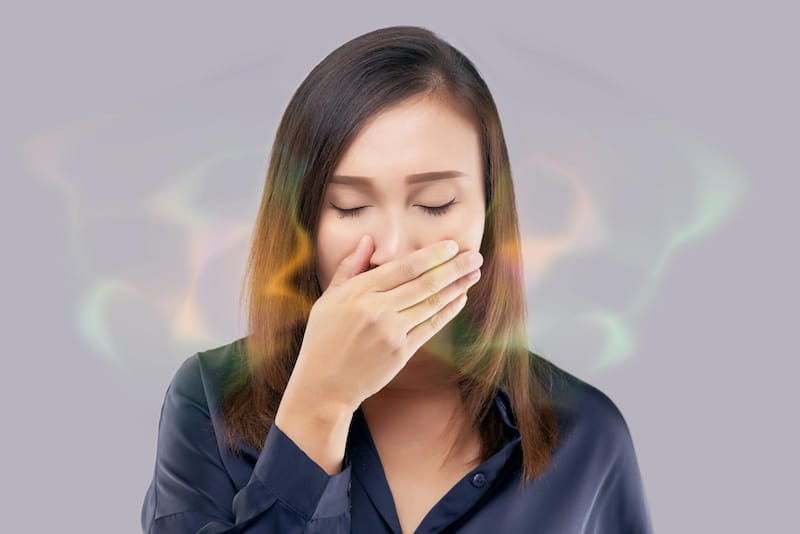While burps are caused by the collection of odorless gas, sulfur burps are stronger as it contains hydrogen sulfide gas which can be triggered by various factors, including your diet and pre-existing medical conditions. Various gallbladder complications such as gall stones and gallbladder attacks can lead to symptoms of excessive sulfur burps. Other health conditions like acid reflux and bacterial infections can also trigger sulfur burps. Identifying whether your burps are caused by acid reflux or gallbladder problems can be tricky as they consist of similar symptoms. However, by assessing the intensity of pain, area of pain, and the timing of pain of these two health conditions, we can notice slight differences. You can treat your sulfur burps through home remedies like ginger and cumin, both known for their fragrance and prominence in promoting digestive health.
Gas buildup in our body is fairly normal, and burping due to this buildup is something we all do daily, whether knowingly or unknowingly.
Even sulfur burps aren’t something you should worry about too much unless it becomes excessive and happens alongside other worrying symptoms.
Sulfur burps originate in our gastrointestinal digestive tract in the form of hydrogen sulfide gas, and it is connected with the gallbladder and the rest of the digestive system in that sense.
What’s the difference between burps and sulfur burps? Are sulfur burps related to gallbladder problems? What underlying health conditions can trigger sulfur burps?
How do you determine if your sulfur burps are about acid reflux or gallbladder problems? How can you get rid of sulfur burps with home remedies?
Burping vs. sulfur burps
Burping is a normal response to when gas collects in your intestinal tract. Your body needs to get rid of this gas either from burping or flatulence.
Without you even noticing, your body might pass gas roughly about 15 to 20 times a day. The gas that’s passed by normal burps is odorless. However, sometimes you might even experience a sulfur mixed strong burp, which is normal as well.
Sulfur burps that you get occasionally contain the gas known as hydrogen sulfide and could be caused by certain diets that you follow.
Even certain behavior patterns like eating too fast, drinking fizzy drinks, eating while talking, and chewing gum can cause you to swallow too much air and trigger sulfur burps.
However, if you experience strong sulfur burps frequently and excessively, it might be a sign of an underlying health condition.
Relation between gallbladder problems and sulfur burps
Your gallbladder is a tiny pear-shaped organ located to the right of your abdomen and is responsible for containing the digestive fluid known as bile.
Gallbladder complications can directly cause a lot of belching. When it comes to gallbladder disease, your bile duct gets irritated and inflamed, resulting in burps, especially after a meal.
Sulfur burps are also associated with gallstone issues, according to a study by the US National Library of Medicine, which stated that dyspeptic symptoms of indigestion such as sulfur burps, bloating, abdominal discomfort, and food intolerance are symptoms of gallstone disease.
If you notice that your sulfur burps are progressing and are accompanied by an unusual persisting pain along your upper back and the right side of your abdomen, chances are that your gallbladder is the root cause of your problems, and what you’re experiencing might be what’s known as a gallbladder attack.
Other underlying conditions causing sulfur burps?

Sulfur burps have a wide range of possibilities, some harmless and some which deserve our attention, as listed below.
- Bacterial infection – Bacteria like helicobacter pylori are quite common around the world and are known to trigger stomach infections. Most people who undergo such infections complain of frequent excessive burping, bloating, abdominal pain, and nausea.
- Inflammatory bowel disease –This is a type of disorder that triggers inflammation in your digestive tract, including complications such as Crohn’s disease and ulcerative colitis. Sulfur burps are one of the less severe symptoms caused by this condition.
- Irritable bowel syndrome – This is a rather severe chronic digestive health condition involving the large intestine. The main symptoms involve diarrhea and constipation of mixed bowel patterns that can affect your day-to-day lifestyle. The symptom of gas might be experienced by you through sulfur burps as well.
- Food intolerances – This occurs when your digestive system doesn’t react properly to certain foods. Common intolerances related to sulfur burping include gluten and lactose intolerance, along with fructose and sorbitol malabsorption.
- GERD – Gastroesophageal reflux disease, also known as GERD, is one of the most common culprits of sulfur burps as it is a result of stomach bile acid rising in your esophagus and excreting in the form of strong acidic burps.
It’s pretty tricky to determine whether your sulfur burps are caused by GERD or gallbladder issues since these conditions cater to similar symptoms.
Gallbladder vs. acid reflux

To treat your sulfur burps, you need to figure out the root cause of it all so that you can seek the proper treatment.
How you can distinguish between the two health conditions are elaborated in the given table.
| Gallbladder | Acid reflux |
|---|---|
| Area of pain – The pain caused by gallbladder complications will mostly be triggered around the center and upper right part of your abdomen, spreading to your back or chest. | Area of pain – Heartburn, being one of the most noticeable symptoms of pain, can be discovered moving from your stomach, up to your abdomen, and to your chest. |
| Timing of the pain – Gallbladder complications can trigger pain only a few hours after having a meal. | Timing of the pain – Acid reflux can commonly be felt after having a large meal. |
| The intensity of pain – Abdominal pain caused by gallbladder problems is known as Biliary colic. This pain may start abruptly and vary in intensity at different times as it comes and goes. | The intensity of pain – Pain might worsen if you bend over or lay down as it makes it easier for stomach acids to travel up your esophagus. |
| Treatment – Gallbladder problems can be treated through a procedure known as cholecystectomy, which involves the surgical removal of the gallbladder. | Treatment – Aggravated acid reflux might require over-the-counter medications and even surgery known as fundoplication. |
How can you get rid of sulfur burps with home remedies?
The best way to treat your sulfur burps is by discovering the underlying cause with medical aid and treating the root.
However, if you’re looking to get rid of this symptom or if what you’re experiencing is mild sulfur burps that disturb your day-to-day life, home remedies are the best option.
- Cumin – If your sulfur burps result from the digestive condition known as irritable bowel syndrome, cumin extract is just the ingredient for you. Cumin is known to work as an antibiotic to fight common digestive infections and even provide relief to heartburns triggered by acid reflux. A 2013 study conducted by the US National Library of Medicine proved the success rate of cumin extract in relieving symptoms such as gas and bloating.
- Turmeric – This is a traditional spice popular in Ayurvedic medicine. A randomized study initiated by the US National Library of Medicine revealed that patients taking turmeric supplements had a higher improvement in flatulence, belching, and heartburn symptoms.
- Ginger – A simple ginger clove can go a long way in treating your sulfur burps as it is ideal for gastrointestinal orders, as revealed by a 2019 study. You can easily brew a tasty ginger tea or even use ginger roots in your meals. Ginger ale, however, is not ideal for this purpose as it can increase the amount of gas in your body, which is the opposite of what you’d want.
- Green tea – A 2010 study proved that the effect of green tea extract promotes digestion health. It can also freshen your breath which can combat the strong sulfur burps.
Over-the-counter medications also exist if home remedies aren’t as effective as you need them to be.
Medicine like bismuth subsalicylate can help minimize the strong odor of your burps, while probiotics contain bacteria that help with healthy digestion.
FAQs
What does a burst gallbladder feel like?
When your gallbladder ruptures, you may experience a sharp pain in the upper right part of your abdomen and the yellowing of your skin and eyes.
Signs of vomiting, nausea, and fever are also to be expected in such situations. You’ll need to seek immediate medical attention if you experience such symptoms.
How do you know if your gallbladder needs to be removed?
If you’re experiencing constant, excruciating pain as a result of gallstones and gallbladder complications, it might be time for you to remove your gallbladder.
Persistent bloating, heartburn, and sharp pains might be valid reasons for such removal.
Does removing your gallbladder help with acid reflux?
The purpose of gallbladder surgery is to be rid of painful gallstones.
While humans can live without a gallbladder, it can increase the risk of acid reflux symptoms as not having a gallbladder allows bile to enter the stomach more easily.
Conclusion
The hydrogen sulfide gas produced in our gastrointestinal tract can cause rather foul-smelling burps, which can be troublesome when you go out and socialize with people.
While you can surely resort to home remedies for temporary relief, your trouble can double up if you don’t get to the bottom of what’s causing your sulfur burps.
Meanwhile, you can also try staying away from other habits that may further trigger sulfur burps, such as high-protein foods and beer.
In the long run, with proper medical treatment for the root cause of your symptoms, you’ll automatically notice that your sulfur burps are gone for good.


